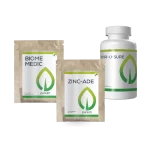Vitamin C, also known as ascorbic acid, is a water-soluble vitamin that is essential for various bodily functions. It is a powerful antioxidant and plays several important roles in maintaining overall health.
Here are some key aspects of vitamin C:
- Chemical Structure: Vitamin C has the chemical formula C6H8O6 and is classified as a water-soluble vitamin. Its molecular structure consists of six carbon atoms, eight hydrogen atoms, and six oxygen atoms.
- Essential Nutrient: Vitamin C is considered an essential nutrient because the human body cannot produce it on its own. Therefore, it must be obtained through the diet or supplements.
- Antioxidant Properties: One of the most well-known functions of vitamin C is its role as an antioxidant. It helps protect cells and tissues from damage caused by free radicals, which are highly reactive molecules that can harm cells and DNA. Antioxidants like vitamin C neutralize these free radicals and help prevent oxidative stress.
- Collagen Production: Vitamin C is crucial for the synthesis of collagen, a protein that is a fundamental component of skin, tendons, ligaments, blood vessels, and other connective tissues. Collagen provides structural support and elasticity to the skin and helps wounds heal.
- Immune System Support: Vitamin C is involved in the function of various immune cells. It helps stimulate the production of white blood cells, which are essential for the body’s defense against infections.
- Iron Absorption: Vitamin C enhances the absorption of non-heme iron, which is the type of iron found in plant-based foods and supplements. This can be particularly important for individuals with iron-deficiency anemia.
- Neurotransmitter Synthesis: Vitamin C is involved in the synthesis of neurotransmitters, such as serotonin and norepinephrine, which play a role in mood regulation and the nervous system’s proper functioning.
- Wound Healing: Vitamin C supports the formation of new blood vessels and the synthesis of connective tissue during the wound-healing process. It can promote faster healing and minimize scarring.
- Eye Health: Vitamin C, along with other antioxidants like vitamin E and zinc, may help reduce the risk of age-related macular degeneration (AMD) and cataracts, two common eye conditions that can lead to vision loss.
- Stress Reduction: Some research suggests that vitamin C may help reduce the physical and psychological effects of stress by supporting the adrenal glands and regulating stress hormone levels.
- Dietary Sources: Vitamin C is naturally present in a variety of foods, with some of the best sources including citrus fruits (e.g., oranges, lemons), strawberries, kiwi, guava, bell peppers, broccoli, spinach, and tomatoes.
The recommended daily intake of vitamin C for most adults is around 65-90 milligrams, but individual requirements may vary based on factors like age, gender, and overall health.
A well-balanced diet that includes a variety of fruits and vegetables can provide an adequate amount of vitamin C for most people. However, in some cases, vitamin C supplements may be recommended under the guidance of a healthcare professional, especially for individuals with specific dietary restrictions or medical conditions.
Here are some of the health benefits associated with vitamin C:
- Immune System Support: Vitamin C is well-known for its immune-boosting properties. It helps stimulate the production of white blood cells, which are essential for fighting off infections. It also supports the skin’s defense mechanisms, acting as a barrier against pathogens.
- Antioxidant Protection: Vitamin C is a potent antioxidant that helps neutralize harmful free radicals in the body. This can help protect cells and DNA from damage caused by oxidative stress, which is associated with various chronic diseases, including cancer and heart disease.
- Collagen Formation: Vitamin C is essential for the production of collagen, a protein that plays a critical role in the formation of skin, tendons, ligaments, and blood vessels. Adequate vitamin C intake helps maintain healthy skin, promote wound healing, and support overall tissue repair.
- Cardiovascular Health: Vitamin C may contribute to heart health by helping to lower blood pressure, reduce the risk of atherosclerosis (hardening of the arteries), and improve blood vessel function. It may also reduce the risk of stroke.
- Iron Absorption: Vitamin C enhances the absorption of non-heme iron (the type of iron found in plant-based foods and supplements). This can be particularly helpful for individuals with iron-deficiency anemia.
- Eye Health: Vitamin C, along with other antioxidants like vitamin E and zinc, may help reduce the risk of age-related macular degeneration (AMD) and cataracts, two common eye conditions that can lead to vision loss.
- Wound Healing: Vitamin C plays a crucial role in the formation of new blood vessels and the synthesis of connective tissue during wound healing. It can speed up the recovery process and minimize scarring.
- Skin Health: Vitamin C is a popular ingredient in skincare products due to its ability to brighten the skin, reduce the appearance of fine lines and wrinkles, and protect against UV-induced damage.
- Reduced Risk of Gout: Some studies suggest that higher vitamin C intake may be associated with a reduced risk of gout, a painful joint condition caused by the buildup of uric acid.
- Stress Reduction: Vitamin C may help reduce the physical and psychological effects of stress by supporting the adrenal glands and reducing the levels of stress hormones like cortisol.
Vitamin C is found in a wide variety of foods, particularly in fruits and vegetables. Including a range of vitamin C-rich foods in your diet can help ensure you meet your daily requirements.
Here are some good dietary sources of vitamin C:
- Citrus Fruits: Citrus fruits are perhaps the most famous sources of vitamin C. These include oranges, grapefruits, lemons, and limes.
- Berries: Berries are excellent sources of vitamin C. Some examples include strawberries, blueberries, raspberries, and blackberries.
- Kiwi: Kiwi is a small but nutrient-dense fruit that provides a significant amount of vitamin C.
- Guava: Guava is an tropical fruit that is exceptionally high in vitamin C, often surpassing the content found in citrus fruits.
- Papaya: Papaya is another tropical fruit that is rich in vitamin C.
- Mango: Mangoes are not only delicious but also contain a good amount of vitamin C.
- Pineapple: Pineapple is a tropical fruit that offers vitamin C along with a unique flavor.
- Bell Peppers: Red, green, and yellow bell peppers are excellent sources of vitamin C. In fact, they often contain more vitamin C than many fruits.
- Broccoli: Broccoli is a cruciferous vegetable that is not only rich in vitamin C but also packed with other nutrients.
- Spinach: Leafy greens like spinach provide vitamin C, though the content may be lower compared to fruits and other vegetables.
- Tomatoes: Tomatoes, whether eaten fresh or in the form of tomato products like tomato sauce and tomato juice, are good sources of vitamin C.
- Strawberry Kiwi: This combination of fruits, strawberries, and kiwi together can provide a significant dose of vitamin C.
- Melons: Some melons, like cantaloupe and honeydew, contain vitamin C.
- Acerola Cherries: Acerola cherries are one of the richest natural sources of vitamin C, containing much higher levels than most other fruits.
- Herbs: Some fresh herbs, such as parsley and cilantro, contain vitamin C and can be used to flavor dishes.
It’s important to note that vitamin C can be sensitive to heat, light, and oxygen. Cooking or storing foods for long periods can lead to a loss of vitamin C content. To retain the maximum amount of vitamin C in your food, consider eating fruits and vegetables raw or using gentle cooking methods like steaming. Additionally, consuming a variety of vitamin C-rich foods as part of a balanced diet can help ensure you get an ample supply of this essential nutrient.
Purium Products that Contain Vitamin C:
Are there any risks or side effects associated with Vitamin C?
Vitamin C is generally considered safe for most people when consumed within the recommended dietary allowances (RDAs) or adequate intake levels, which can vary depending on age, gender, and life stage. However, excessive intake of vitamin C through supplements may lead to some potential risks or side effects:
- Gastrointestinal Distress: High doses of vitamin C, typically in excess of 2,000 milligrams per day, can lead to gastrointestinal symptoms such as diarrhea, nausea, cramps, and abdominal pain. These symptoms usually resolve once vitamin C intake is reduced.
- Kidney Stones: There is some concern that excessive vitamin C supplementation may increase the risk of kidney stones, particularly in individuals with a history of kidney stones or kidney disease. Vitamin C can be metabolized into oxalate, a substance that can contribute to stone formation in susceptible individuals.
- Iron Absorption: While vitamin C can enhance the absorption of non-heme iron (the type of iron found in plant-based foods and supplements), it may also lead to increased iron absorption from iron-rich foods. This could be problematic for individuals with hemochromatosis or other conditions that result in iron overload.
- Interference with Certain Medications: High-dose vitamin C supplements may interact with certain medications, such as blood-thinning medications like warfarin (Coumadin) and certain chemotherapy drugs. It’s important to consult with a healthcare professional if you are taking medications and considering vitamin C supplements.
- Allergic Reactions: Allergic reactions to vitamin C are rare but can occur. Symptoms of an allergic reaction may include hives, itching, swelling, difficulty breathing, and rash. If you suspect an allergy to vitamin C, seek medical attention immediately.
- Other Side Effects: In some cases, high-dose vitamin C supplements may lead to symptoms such as headache, fatigue, and insomnia. These side effects are typically mild and temporary.
It’s important to emphasize that most people can obtain an adequate amount of vitamin C through a balanced diet that includes a variety of fruits and vegetables. Serious adverse effects of vitamin C are rare when obtained from dietary sources.
If you are considering vitamin C supplementation, especially at high doses, it’s advisable to consult with a healthcare professional. They can help determine if you have specific health needs that warrant supplementation and recommend an appropriate dosage to avoid potential side effects or interactions with medications. For most individuals, meeting their vitamin C needs through food sources is a safe and effective way to maintain good health.
Takeaway
Vitamin C, or ascorbic acid, is a vital nutrient with a wide range of health benefits. It plays a crucial role in supporting the immune system, acting as a powerful antioxidant to protect cells, and promoting collagen production for healthy skin and tissue repair.
Found abundantly in various fruits and vegetables, vitamin C is accessible through a well-balanced diet. While it is generally safe when consumed within recommended limits, excessive supplementation may lead to potential side effects. Therefore, it’s advisable to obtain this essential nutrient primarily from natural food sources, ensuring that individuals can enjoy the numerous advantages of vitamin C while minimizing any associated risks.
Maintaining a diet rich in vitamin C contributes to overall well-being and supports various aspects of health, from immune function to skin vitality.
Vitamin C may help reduce the physical and psychological effects of stress! #HealthSurgeon
READ MORE: Can You Take Vitamin C And Zinc Together?
Sources:
https://www.mayoclinic.org/drugs-supplements-vitamin-c/art-20363932#:~:text=Vitamin%20C%20is%20an%20antioxidant,disease%2C%20cancer%20and%20other%20diseases.
https://www.nhs.uk/conditions/vitamins-and-minerals/vitamin-c/
https://www.hsph.harvard.edu/nutritionsource/vitamin-c/









